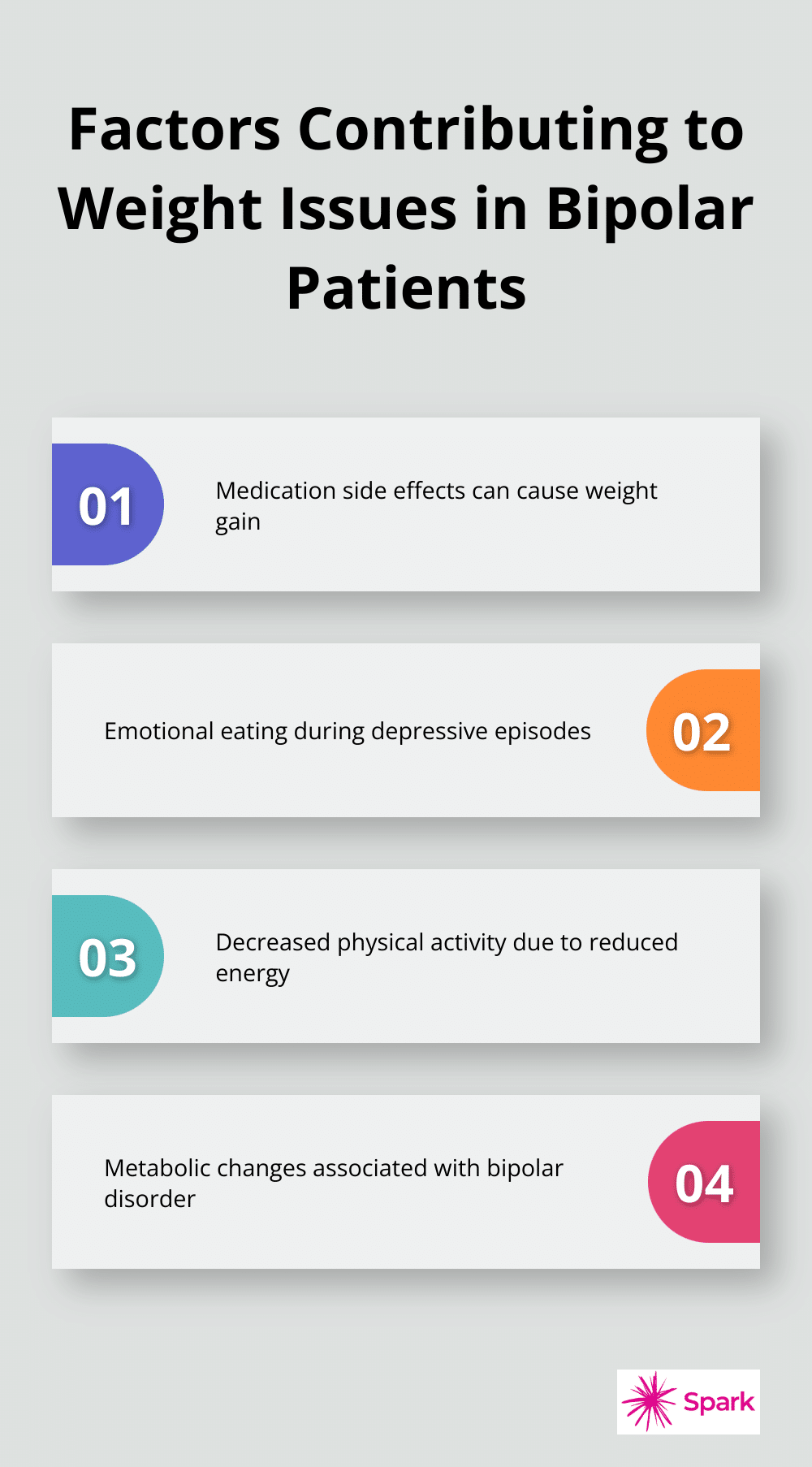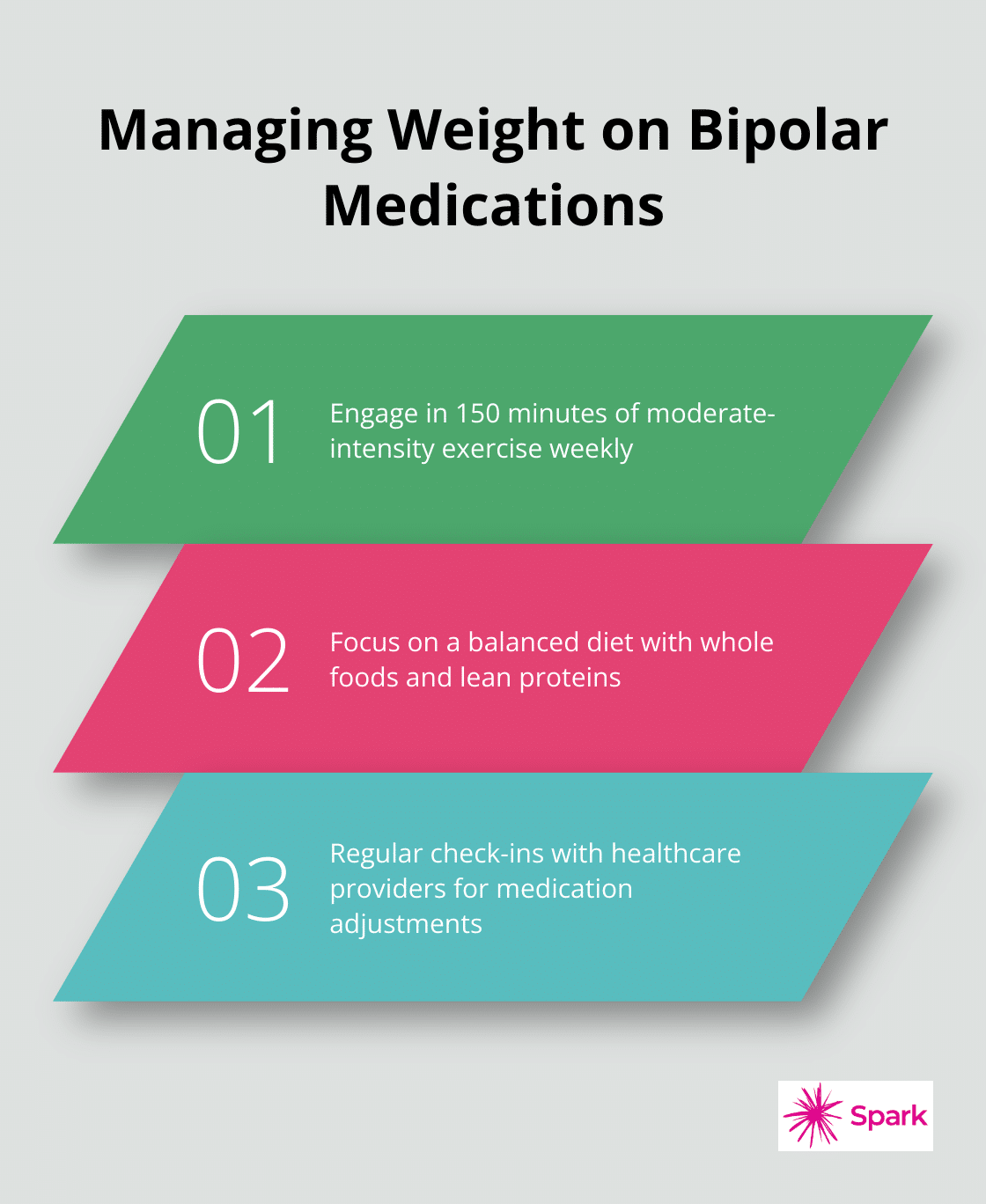At Spark Healthcare, we understand the complex relationship between bipolar depression, medication, and weight management.
Many individuals with bipolar disorder struggle with weight fluctuations, which can significantly impact their overall health and treatment outcomes.
In this blog post, we’ll explore the effects of bipolar depression medications on weight and provide strategies for managing weight while maintaining effective treatment.
We’ll also discuss bipolar depression medication options that may promote weight loss or have a neutral effect on weight.
What Is Bipolar Depression and How Does It Affect Weight?
Understanding Bipolar Depression
Bipolar depression is a complex mental health condition characterized by extreme mood swings. These swings include periods of intense emotional highs (mania or hypomania) and lows (depression). During depressive episodes, individuals often experience persistent sadness, loss of interest in activities, and changes in appetite and sleep patterns.
The Weight Struggle in Bipolar Depression
Weight fluctuations present a common challenge for people with bipolar depression. Research indicates that individuals with bipolar disorder have a significantly higher prevalence of obesity compared to the general population.

Several factors contribute to weight issues in bipolar patients:
- Medication side effects: Many bipolar medications (particularly mood stabilizers and antipsychotics) can cause weight gain.
- Emotional eating: During depressive episodes, some individuals turn to food for comfort, leading to overeating.
- Decreased physical activity: Depression often results in reduced energy levels and motivation, making regular exercise difficult.
- Metabolic changes: Bipolar disorder itself may affect metabolism, potentially contributing to weight gain.
The Impact of Weight on Bipolar Management
Weight significantly affects overall health and bipolar management. Excess weight can lead to various health complications, including:
- Cardiovascular disease: Recent research suggests that bipolar disorder increases the risk of major adverse cardiac events, such as heart attack and stroke.
- Type 2 diabetes: Research shows that bipolar patients are at increased risk of developing diabetes compared to those without the condition.
- Sleep apnea: Excess weight increases the risk of sleep apnea, which can exacerbate mood symptoms in bipolar disorder.
Effective Strategies for Weight Management
Managing weight while dealing with bipolar depression requires a multifaceted approach:
- Medication management: Work closely with your psychiatrist to find medications that effectively manage your symptoms while minimizing weight gain. Some newer medications have shown a more favorable weight profile.
- Nutritional counseling: Consult a registered dietitian who specializes in mental health. They can help create a balanced meal plan that supports mood stability and weight management.
- Regular physical activity: Try to engage in at least 150 minutes of moderate-intensity exercise per week. This not only aids in weight management but also helps improve mood and reduce depressive symptoms.
- Mindfulness practices: Techniques like mindful eating can help combat emotional eating patterns often associated with bipolar depression.
- Sleep hygiene: Establish a consistent sleep schedule to regulate mood and metabolism. The National Sleep Foundation recommends 7-9 hours of sleep per night for adults.
As we move forward, it’s important to consider how specific medications for bipolar depression can affect weight. In the next section, we’ll explore various medication options and their potential impact on body weight.
How Bipolar Medications Impact Weight
Weight-Neutral and Weight-Loss Promoting Options
Some bipolar medications have minimal impact on weight or may promote weight loss. Lamotrigine, a mood stabilizer, is generally weight-neutral; a study found it was not associated with weight gain in 1137 patients over 12 weeks.
Aripiprazole, an atypical antipsychotic, offers a lower risk of weight gain. Some patients experience weight loss on this medication. A meta-analysis in the Journal of Clinical Psychopharmacology reported that aripiprazole was associated with a mean weight loss of 0.93 kg over 3-4 months.
Ziprasidone and lurasidone are two other antipsychotics that have shown minimal effects on weight. These medications can be excellent options for patients concerned about weight gain.
Medications Associated with Weight Gain
Many effective bipolar medications are associated with significant weight gain. Lithium, a common mood stabilizer, can cause weight gain in up to 25% of patients. The average weight gain is about 4-5 kg over the first two years of treatment.
Valproic acid, another mood stabilizer, is notorious for causing weight gain. Studies show that up to 70% of patients on valproic acid experience weight gain, with an average increase of 5-10 kg within the first year.

Among antipsychotics, olanzapine and quetiapine are particularly associated with weight gain. Olanzapine can lead to an average weight gain of 4.15 kg over just 10 weeks, while quetiapine is linked to an average increase of 2.1 kg in the same period.
Understanding Weight Gain Mechanisms
The mechanisms behind medication-induced weight gain are complex. Some medications, like olanzapine, increase levels of ghrelin (a hormone that stimulates appetite). Others may affect metabolism and fat storage.
Antidepressants, often used in bipolar treatment, can also impact weight. While some, like fluoxetine, are typically weight-neutral, others may contribute to weight gain.
It’s important to note that individual responses to medications can vary greatly. What causes significant weight gain in one person might have minimal impact on another. This variability underscores the importance of personalized treatment plans and close monitoring.
The Role of Personalized Treatment
Finding the right medication balance for each patient requires consideration of both symptom management and potential side effects like weight gain. Some medications used to treat bipolar disorder can increase your appetite or cause changes in metabolism leading to weight gain. Regular check-ins and medication adjustments are often necessary to achieve optimal results.
The next section will explore strategies for managing weight while on bipolar medications, including lifestyle changes and potential medication adjustments. These strategies can help patients maintain a healthy weight without compromising their mental health treatment.
How to Manage Weight on Bipolar Medications
Nutrition and Exercise: Key Components
A balanced diet plays a vital role in weight management. Patients should focus on whole foods, lean proteins, and an abundance of fruits and vegetables. Processed foods and sugary drinks should be limited. Adherence to the Mediterranean diet is inversely related to binge eating disorder in patients seeking a weight loss program.
Regular exercise is equally important. Patients should try to engage in at least 150 minutes of moderate-intensity exercise per week (as recommended by the American Heart Association). This can include brisk walking, swimming, or cycling. Exercise not only aids in weight management but also helps improve mood and reduce depressive symptoms. An acute bout of exercise (i.e., walking on a treadmill for 20 min at 70% of the individual’s maximum heart rate) significantly improved mood.

Medication Adjustments: Exploring Options
If weight gain becomes a significant issue, patients should discuss potential medication adjustments with their healthcare provider. Some options include:
- Switching to weight-neutral medications: For example, lamotrigine has shown minimal impact on weight.
- Adding a weight-loss promoting medication: Metformin (typically used for diabetes) has shown promise in mitigating antipsychotic-induced weight gain. Prescribing metformin at the outset of treatment can lower weight gain by 6.5 to 11 pounds compared with not prescribing it.
- Adjusting dosages: Sometimes, lowering the dose of a weight-gain-associated medication can help manage weight without compromising symptom control.
Collaboration with Healthcare Team
Regular check-ins with healthcare providers are essential. Patients should keep a detailed log of their weight, mood symptoms, and any side effects they experience. This information can help providers make informed decisions about treatment plans.
Working with a registered dietitian who specializes in mental health can be beneficial. They can create a personalized meal plan that supports both weight management goals and mental health needs.
Cognitive Behavioral Therapy (CBT) can also prove valuable. CBT can address emotional eating patterns often associated with bipolar disorder. A study in the International Journal of Bipolar Disorders found that CBT effectively reduced binge eating episodes in bipolar patients.
Monitoring and Adjusting
Weight management is an ongoing process that requires consistent monitoring and adjustment. Patients should:
- Track their weight regularly (weekly or bi-weekly)
- Monitor their mood and energy levels
- Note any changes in appetite or eating habits
- Record side effects from medications
This information can help healthcare providers make necessary adjustments to treatment plans and ensure optimal management of both bipolar symptoms and weight.
Final Thoughts
Managing bipolar depression while maintaining a healthy weight requires a balanced approach. The right combination of medication, lifestyle changes, and professional support can lead to successful outcomes. Patients must work closely with their healthcare providers to find the most effective treatment plan that addresses both their mental health needs and weight concerns.
Bipolar depression medication and weight loss don’t have to be mutually exclusive goals. Some medications have minimal impact on weight or may even promote weight loss, while others are associated with weight gain. Open communication with healthcare providers allows for necessary adjustments to treatment plans, ensuring optimal management of both bipolar symptoms and weight.
At Spark Mental Health, we offer tailored telepsychiatry services to help navigate the complexities of bipolar disorder treatment. Our team of professionals can develop a comprehensive treatment plan that balances effective symptom management with weight considerations. With the right support and guidance, patients can effectively manage their bipolar depression while maintaining overall well-being.






